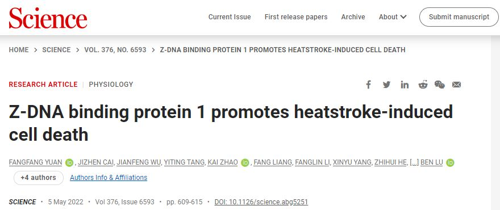 May 05, 2022, Professor Lv Ben’s team at the Third Xiangya Hospital of Central South University A Research Article was published online in Science, entitled“Z-DNA binding protein 1 promotes heatstroke-induced cell death”, Reveals the important lethal mechanism of heat stroke—hyperthermia induces excessive programmed cell death through ZBP1 protein, which leads to disseminated intravascular coagulation (DIC) and multiple organ damage span>. The first unit of this paper is the Third Xiangya Hospital of Central South University. Postdoctoral fellow Yuan Fangfang from the Third Xiangya Hospital of Central South University is the first author, and Professor Lu Ben is the corresponding author.
May 05, 2022, Professor Lv Ben’s team at the Third Xiangya Hospital of Central South University A Research Article was published online in Science, entitled“Z-DNA binding protein 1 promotes heatstroke-induced cell death”, Reveals the important lethal mechanism of heat stroke—hyperthermia induces excessive programmed cell death through ZBP1 protein, which leads to disseminated intravascular coagulation (DIC) and multiple organ damage span>. The first unit of this paper is the Third Xiangya Hospital of Central South University. Postdoctoral fellow Yuan Fangfang from the Third Xiangya Hospital of Central South University is the first author, and Professor Lu Ben is the corresponding author.  Hyperthermia-induced critical illness is heat stroke (also known as “severe heatstroke”). However, the pathophysiological mechanism of how hyperthermia induces a severe state was not well understood. Using clues obtained from previous studies on sepsis, Prof. Lv Ben’s team revealed the lethal effect of hyperthermia in the occurrence and development of heat stroke by inducing ZBP1-dependent programmed cell death.subverted the past The academic viewpoint of “Hyperthermia leads to organ failure through physical damage”,shows the intrinsic link between temperature sensing, programmed cell death, DIC and organ failure, which is a good source of heat stroke It provides important ideas for the prevention and treatment of other critical illnesses.
Hyperthermia-induced critical illness is heat stroke (also known as “severe heatstroke”). However, the pathophysiological mechanism of how hyperthermia induces a severe state was not well understood. Using clues obtained from previous studies on sepsis, Prof. Lv Ben’s team revealed the lethal effect of hyperthermia in the occurrence and development of heat stroke by inducing ZBP1-dependent programmed cell death.subverted the past The academic viewpoint of “Hyperthermia leads to organ failure through physical damage”,shows the intrinsic link between temperature sensing, programmed cell death, DIC and organ failure, which is a good source of heat stroke It provides important ideas for the prevention and treatment of other critical illnesses.
2021 Nobel Prize in Physiology or Medicine for Tactile Sensors ,” highlighting the important discovery by Julius’ team that the capsaicin receptor TRPV1 on the cell membrane is an ion channel that can be activated by high temperature. This study by Prof. Lv Ben’s team from the Third Xiangya Hospital of Central South University clearly suggests that there are also “thermoreceptors” in the cytoplasm, which can induce ZBP1-dependent programmed cell death when stimulated by high temperature. Although this life phenomenon may play a protective role in anti-infection immunity, it can lead to DIC, multiple organ damage and even death under the action of persistent hyperthermia. The above research is an important continuation of the previous work of Professor Lv Ben’s team. The team members are mainly from the Department of Hematology and Critical Care Medicine. In recent years, the team has revealed the important mechanism of the formation of critical DIC and multiple organ failure, and published a series of NI index papers with the Third Xiangya Hospital of Central South University as the first unit, including ” Science, Immunity (3 papers), Blood, Nat Commun (2 papers) and J Biol Chem (2 papers), which have been highly appraised by the academic community.
< /p>